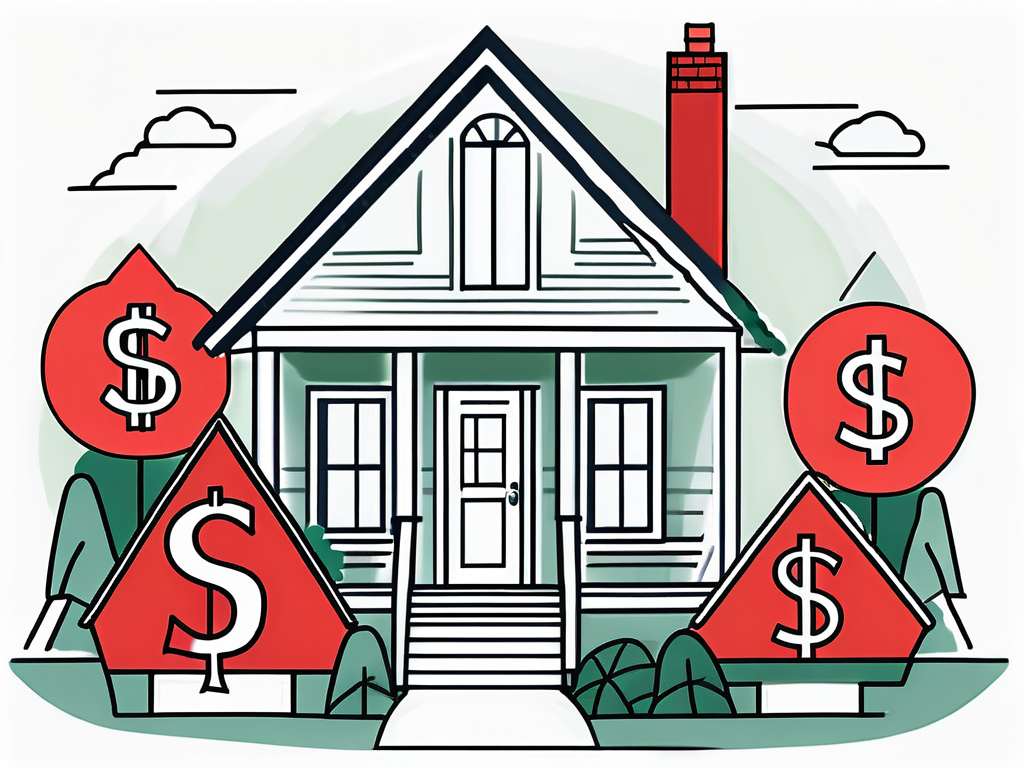How Does Redfin Make Money?

Have you ever wondered how Redfin, the real estate company, manages to make money in the competitive world of home sales? Well, grab a cup of coffee and get ready to dive into the fascinating world of Redfin's business model. From their unique value proposition to their revenue streams, we'll explore it all in this article.
Understanding Redfin's Business Model
At the core of Redfin's success is their innovative use of technology to streamline the home buying and selling process. By harnessing the power of data and automation, Redfin is able to provide a seamless experience for both buyers and sellers. It's like having a personal real estate agent in your pocket, but without the hefty commission fees.

Redfin's commitment to leveraging technology goes beyond just simplifying the real estate process. They continuously invest in research and development to stay ahead of the curve. This dedication has led to the creation of cutting-edge tools that empower users with real-time market insights and trends, giving them a competitive edge in the housing market.
The Role of Technology in Redfin's Operations
Redfin's platform utilizes advanced algorithms and machine learning to help buyers find their dream homes. With just a few clicks, users can filter through thousands of listings based on their specific preferences. It's like online shopping, but for houses!
But Redfin's technology doesn't stop at the search process. They've also streamlined the home touring and offer-making stages. Through their website and mobile app, buyers can schedule tours and submit offers directly, making the entire process more efficient and convenient.
Moreover, Redfin's technology extends to providing users with valuable data-driven insights. By analyzing market trends and historical data, Redfin equips buyers and sellers with the information they need to make informed decisions. This data-driven approach not only enhances transparency in the real estate market but also fosters trust and confidence among users.
Redfin's Unique Value Proposition
So, what sets Redfin apart from traditional real estate agencies? One word: savings. While most agents charge a standard commission fee of around 3%, Redfin offers a more affordable alternative. Sellers can list their homes with Redfin for a 1-1.5% commission fee, potentially saving thousands of dollars.
Additionally, Redfin's commitment to customer satisfaction sets them apart in the industry. Their team of experienced agents not only provide expert guidance throughout the buying or selling process but also prioritize customer service. Whether it's answering queries promptly or offering personalized recommendations, Redfin ensures that every client feels supported and valued.
Redfin's Revenue Streams
Now, you may be wondering, how does Redfin make money if they charge lower commission fees? Well, let's explore their revenue streams to find out.
Commission Fees from Home Sales
While Redfin's commission fees may be lower, the high volume of transactions they facilitate more than makes up for it. By operating in multiple markets across the country, Redfin earns a significant portion of their revenue from commission fees. It's all about quantity, not just quality!
Imagine this: you're selling your home and decide to list it with Redfin. A buyer comes along, falls in love with the house, and makes an offer. Redfin's agent assists with the negotiation process, ensuring you get the best deal possible. And when the sale is finalized, Redfin collects a commission fee based on the sale price. It's a win-win for everyone involved!
RedfinNow and Direct Access Services
Redfin doesn't just rely on traditional home sales to generate revenue. They've also expanded into the direct buying market with their RedfinNow program. This service allows homeowners to sell their properties to Redfin directly, bypassing the traditional listing and negotiation process. It's like hitting the fast-forward button on selling your home.
Additionally, Redfin offers various direct access services, such as mortgage, title, and escrow. By providing these services in-house, Redfin can earn additional revenue while ensuring a smoother transaction process for their clients. It's a win-win-win!
Advertising and Partnerships
Remember those personalized ads for real estate listings that seem to magically pop up on your screen? Well, chances are Redfin had a part to play in that. Redfin generates revenue through advertising and partnerships with third-party companies. By leveraging their vast user base and extensive data, Redfin offers targeted advertising opportunities to reach potential buyers and sellers. It's like having a digital marketing team working behind the scenes!
But wait, there's more! Redfin's advertising and partnerships go beyond just online ads. They have also formed strategic alliances with various industry players to enhance their revenue streams. For example, Redfin has partnered with local service providers, such as home inspectors and contractors, to offer exclusive deals to their clients. This not only benefits Redfin financially but also provides added value to their customers.
Furthermore, Redfin has ventured into the realm of real estate data and analytics. They have developed sophisticated algorithms and predictive models that can analyze market trends and provide valuable insights to buyers, sellers, and investors. This data-driven approach not only helps Redfin attract more customers but also opens up new avenues for revenue generation, such as selling market reports and offering premium data subscriptions.
So, you see, Redfin's revenue streams are diverse and innovative. They have successfully combined traditional commission fees with direct buying programs, in-house services, targeted advertising, strategic partnerships, and cutting-edge data analytics. By constantly evolving and adapting to the ever-changing real estate landscape, Redfin continues to thrive and revolutionize the industry.
Redfin's Cost Structure
Now that we've explored Redfin's revenue streams, let's take a peek at their cost structure. After all, making money isn't just about generating revenue; it's also about keeping expenses in check.

Understanding the intricacies of Redfin's cost structure provides insight into how the company manages its financial resources to sustain and grow its operations. By delving into the various components that contribute to their expenditure, we can appreciate the strategic decisions made to optimize efficiency and profitability.
Operational Expenses
Running a nationwide real estate company involves a myriad of operational expenses. From staffing to office spaces to logistics, Redfin invests in the infrastructure required to keep their operations running smoothly. It's like a well-oiled machine behind the scenes!
Ensuring seamless coordination and execution across multiple locations demands a robust operational framework. Redfin's commitment to maintaining high standards in operational efficiency underscores their dedication to providing exceptional service to clients while managing costs effectively.
Marketing and Advertising Costs
Just like any other business, Redfin invests in marketing and advertising to attract both buyers and sellers. From online campaigns to traditional advertising channels, Redfin ensures their brand stays top of mind in the competitive real estate market. It's like a constant game of "look at us!" with a touch of creativity!
The dynamic nature of the real estate industry necessitates a strategic approach to marketing and advertising. Redfin's investment in innovative campaigns and targeted strategies reflects their commitment to staying ahead of market trends and engaging with a diverse audience to drive business growth.
Technology Development and Maintenance
Remember that innovative technology we mentioned earlier? Well, developing and maintaining it requires significant investments. Redfin continually invests in research, development, and updates to ensure their platform remains cutting-edge. It's like having a team of tech gurus working round the clock to deliver the best user experience!
The seamless integration of technology into every aspect of Redfin's operations underscores their commitment to enhancing user experience and streamlining processes. By prioritizing ongoing technological advancements, Redfin demonstrates a forward-thinking approach to innovation that sets them apart in the competitive real estate landscape.
The Profitability of Redfin
Now, let's dig into the financials and see how profitable Redfin's business model truly is.
Revenue Growth over the Years
Redfin has experienced impressive revenue growth over the years, thanks to their expanding market presence and increasing transaction volume. The combination of their affordable commission fees and tech-driven approach has helped them capture a significant share of the real estate market. It's like a rocket ship soaring to new heights!
Moreover, Redfin's strategic partnerships with various industry players have also contributed to their revenue growth. By collaborating with mortgage lenders, title companies, and other service providers, Redfin has been able to offer a one-stop-shop experience for their customers, further solidifying their position in the market. This diversified revenue stream not only boosts their financial performance but also enhances customer loyalty and satisfaction.
Profit Margins and Net Income Analysis
While Redfin may not have the same profit margins as traditional real estate agencies, their focus is on long-term growth and market dominance. By operating on a more efficient and cost-effective model, they can pass on the savings to their customers while still generating a healthy net income. It's like having your cake and eating it too!
In addition to their core business of buying and selling homes, Redfin has also ventured into complementary services such as property management and relocation assistance. These strategic expansions not only contribute to their overall revenue but also provide a cushion against market fluctuations in the real estate sector. By diversifying their service offerings, Redfin demonstrates resilience and adaptability in a competitive industry landscape.
Future Prospects for Redfin's Business Model
So, what does the future hold for Redfin? Let's look at some potential challenges and opportunities they might face.

Potential Challenges and Risks
As with any business, Redfin faces certain challenges and risks. Market fluctuations, regulatory changes, and increased competition are just a few examples. However, Redfin's ability to adapt quickly and leverage their technological edge puts them in a strong position to weather any storm. It's like being the superhero of the real estate industry!
One specific challenge that Redfin might encounter in the future is the potential impact of economic downturns on the real estate market. A recession could lead to decreased demand for housing, affecting Redfin's transaction volume and revenue. However, Redfin's diversified business model, which includes revenue streams from services like mortgage and title, could help mitigate the impact of a downturn.
Opportunities for Expansion and Diversification
On the flip side, Redfin also has numerous opportunities for expansion and diversification. As technology continues to evolve, Redfin can leverage new advancements to improve their platform and expand into new markets. It's like having a world of possibilities at their fingertips!
Moreover, Redfin could explore strategic partnerships with other industries, such as home renovation or interior design, to offer a more comprehensive suite of services to their customers. By tapping into these adjacent markets, Redfin could enhance customer loyalty and increase their market share.
So, there you have it—a fun and educational journey into the world of Redfin's business model. From their technology-driven approach to their revenue streams and cost structure, Redfin has carved out a unique space in the real estate industry. Whether you're buying, selling, or just curious about the market, Redfin is there to guide you every step of the way. It's like having a friend in the real estate business!





